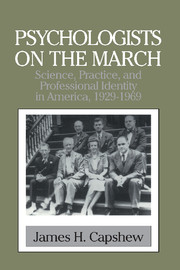Book contents
- Frontmatter
- Contents
- Acknowledgments
- List of Abbreviations
- Introduction: The Psychologists' War
- Interlude I
- 1 Growing Pains: After the Great War
- 2 Mobilizing for World War II: From National Defense to Professional Unity
- 3 Home Fires: Female Psychologists and the Politics of Gender
- Interlude II
- 4 Sorting Soldiers: Psychology as Personnel Management
- 5 Applied Human Relations: The Utility of Social Psychology
- 6 From the Margins: Making the Clinical Connection
- 7 Engineering Behavior: Applied Experimental Psychology
- Interlude III
- 8 A New Order: Postwar Support for Psychology
- 9 Remodeling the Academic Home
- Interlude IV
- 10 The Mirror of Practice: Toward a Reflexive Science
- 11 Beyond the Laboratory: Giving Psychology Away
- Interlude V
- Epilogue: Science in Search of Self
- Index
5 - Applied Human Relations: The Utility of Social Psychology
Published online by Cambridge University Press: 06 July 2010
- Frontmatter
- Contents
- Acknowledgments
- List of Abbreviations
- Introduction: The Psychologists' War
- Interlude I
- 1 Growing Pains: After the Great War
- 2 Mobilizing for World War II: From National Defense to Professional Unity
- 3 Home Fires: Female Psychologists and the Politics of Gender
- Interlude II
- 4 Sorting Soldiers: Psychology as Personnel Management
- 5 Applied Human Relations: The Utility of Social Psychology
- 6 From the Margins: Making the Clinical Connection
- 7 Engineering Behavior: Applied Experimental Psychology
- Interlude III
- 8 A New Order: Postwar Support for Psychology
- 9 Remodeling the Academic Home
- Interlude IV
- 10 The Mirror of Practice: Toward a Reflexive Science
- 11 Beyond the Laboratory: Giving Psychology Away
- Interlude V
- Epilogue: Science in Search of Self
- Index
Summary
Three months after the creation of the Emergency Committee in Psychology in August 1940, the National Research Council sponsored a Conference on Psychological Factors in Morale. Twenty-five psychologists attended the two-day meeting, held in Washington. Gordon Allport, a social psychologist at Harvard who served as APA president in 1939, chaired the sessions. Organizational problems dominated the agenda, particularly the relation of the Emergency Committee to morale work. Discussion revealed a generational split, with younger members of the conference expressing some misgivings about organizing under the wing of the newly formed Emergency Committee. Allport thought the issue of morale merited wide consideration: “is not morale so gigantic a problem that it ought to feature large in the work of the NRC and not be located as a tail to the Emergency Committee's kite?” He argued that it might be best to “assemble a mixed group of social scientists” as a subcommittee.
Allport, slightly senior to the younger group of social psychologists, was well aware of his role as a representative of their interests in the psychological establishment. In addition to his prominent Harvard perch, he had been the first APA president to be identified with the field of social psychology. Before the conference, he had been involved in the Committee for National Morale, a civilian initiative organized by Arthur Upham Pope, a Persian art expert who had been active in similar efforts during the First World War.
- Type
- Chapter
- Information
- Psychologists on the MarchScience, Practice, and Professional Identity in America, 1929–1969, pp. 116 - 127Publisher: Cambridge University PressPrint publication year: 1999

